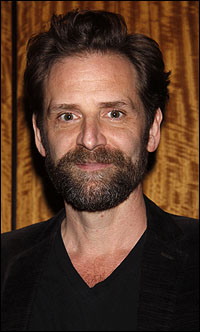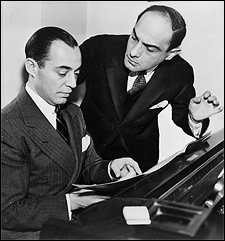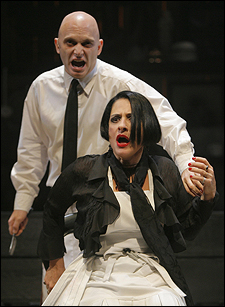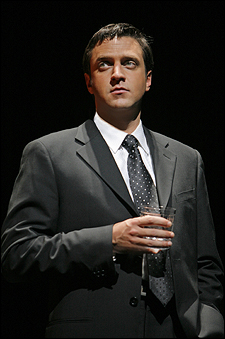
*
John Doyle won the Best Direction Tony in 2006 for his striking Broadway revival of Stephen Sondheim's Sweeney Todd, in which the storytellers of the dark musical acted and sang while playing their own instruments — and accompanying others. Doyle had success again with the same approach to the material (it's not a "gimmick" or a "concept," he says gently) with Company, which earned the 2007 Tony for Best Musical Revival. This month, Williamstown Theatre Festival in Massachusetts produces the U.S. premiere of Ten Cents a Dance, a musical devised by Doyle and first presented in a co-production between England's Watermill Theatre and the International Festival of Musical Theatre in Wales. Using the songs of composer Richard Rodgers and lyricist Lorenz Hart, Doyle created a scenario in which a Man at a piano conjures the major Woman of his life — played by five different actresses representing different phases of the lady's life. The dawning WTF co-production with McCarter Theatre (which will present the show in New Jersey in September) is a much-revised version of the earlier piece, with the Man (in this case, the actor Malcolm Gets, who is also a gifted pianist) having a larger presence. Among the actresses on stage is Tony winner Donna McKechnie. We talked to Doyle (also known for A Catered Affair on Broadway and Road Show Off-Broadway, as well as operas and plays) by phone from Massachusetts, in between rehearsals.
I'm a huge fan of Rodgers & Hart — they offer such texture to the American songbook — and I'm glad that a new generation gets to discover them when a revival of Pal Joey or Boys From Syracuse happens, or when a "new" show like yours happens.
John Doyle: That was kind of the reason for doing it. Cardiff, in Wales, has an International Festival of Musical Theatre, and they commissioned it originally because they wanted to do a Rodgers & Hart show. They asked me if I would do a sort of Rodgers & Hart revue, if we call it that. I don't really like that — it's an evening of Rodgers & Hart. And I did it for that very reason: Because I just think the songs are so wonderful, and they're often forgotten about, somehow. Many of the songs are almost better out of the context of the shows they were written for. They stand so beautifully in their own right.
The concept is that it's one man and five women?
JD: That's right. The five women play the same woman, basically. So, he plays — you know the song — he plays Johnny as in "Johnny One Note" and she plays Miss Jones as in "Have You Met Miss Jones?" It's not exactly a linear story because it's a song cycle, you know. [It's] approximately 36 of the songs of Rodgers & Hart put together as a song cycle.
How different is it from the U.K.?
JD: Quite different. I mean, the casting has determined the difference to a large extent. It is totally rearranged music. It's physically entirely different. Different designers. So, really, I went back to the material and started again, and I restructured quite a lot of who sings what. You know, when it was first put together, it was put together around six performers — I tailored it according to their particular skills, and I did the same thing again this time. The basic notion of this man meeting this woman by the "blue moon," if you like [laughs], in the night, who he remembers and who has been a relationship in his life. It's a broken relationship. That still stands, and the reconciliation that comes through song is still pretty well the same, but I think this has got a great deal more of dramatic depth to it, really. I've worked with four of [the performers] before, so that's nice because you have a good starting point. That's been a great help. And, this is the first show I've done since Company, actually, that uses the actors who make their own music. I haven't done one in this country since that point…mainly because I wanted to prove that I could read words and do other things, you know what I'm saying? And not just do one thing…. The actor-musician shows represent one part of your creative life. The truth is, I think the bulk of what you direct is not actor-musician shows.
JD: Absolutely. That's right. I think I've directed something like 260 shows in my life and 20 of them have been actor-musician shows. [Laughs.] I just happen to be lucky enough to gain some notoriety from doing them, which is not a bad thing. It's better to be known for something than nothing at all, so I don't mind that at all, really. But, I needed to stop it for a while, but I am very glad to be back to it, I have to say, I've really enjoyed it.
| |
 |
|
| Malcolm Gets | ||
| photo by Joseph Marzullo/WENN |
JD: Yeah, that's right.
I wanted to ask you about when you first approached the Rodgers & Hammerstein Organization for rights. Did they say, "Here is the catalogue — have at it," or were there restrictions?
JD: Well, the first time around — I actually made it at the Watermill Theatre where I made the other shows, Sweeney and others. That's a tiny theatre in the middle of a garden. I picked up some songs and [got permission] through performing rights' societies and got the right to do them, never thinking that anybody would be there from the Rodgers & Hammerstein Organization! Little did I know that Ted Chapin from Rodgers & Hammerstein saw it in Cardiff. Fast forward to not so very long ago, really, and Ted said to me, "You should reinvestigate that Rodgers & Hart evening. I really think there's something about it." And, I nearly fell off my chair, thinking, "Oh my God! He saw it!" So, obviously because of knowing him, because of them knowing me, there's more trust, so I was able to look at the catalogue, yes. But now everything has been done in very close connection with them — very close conjunction with them.
You treat the songs as literature.
JD: I don't twist the words of anything. I am totally truthful to the lyric and to the melodies of the material. It really does primarily use the famous songs because they're the ones that stand on their own best, that's why they become famous songs. There will be certain standards in it: "You're Nearer," "It Never Entered My Mind"… There are a few songs peppered into it that are less known like the "Roxy Music Hall"… It's fun to use one or two that are kind of not as great — "great" in terms of being as known as the others — that serve a purpose in how the piece is developed. And having these wonderful actresses! Four of the five of them playing instruments. Well, they all play instruments, but four of the five of them really are instrumentalists, and then Malcolm Gets at the piano….
You have the advantage of Malcolm being a great pianist.
JD: He really can do it and he's a really good actor, so it's thrilling, thrilling for me to work with Malcolm. And then, you know, the cherry on the cake is, of course, Donna McKechnie. Doing a show called Ten Cents a Dance and you have Donna McKechnie playing Miss Jones Number Five, it's thrilling. It's absolutely thrilling.
She moves, I assume? She dances?
JD: Yeah. She does in the way that they all move in it. It has much more melancholy in it. I think, in psychology, there's certainly a lot of emotion in it and a lot of joy in it — like any relationship — which is what it's exploring. It's exploring the relationship between a man and a woman and you can call the woman the muse to this man if you'd like. I don't want to put too many words to it because I am very keen to see what people think, what they get from it. I like to think that it goes to a little more truly emotional journey than the word "revue" suggests, which is why I said I wasn't too keen on the word. It's problematic because "song cycle" sounds a bit pompous. But they certainly are a collection of songs explored in the context of a relationship. If you take a song that was once sung by a young character, for example, and put those words into the mouth of an older woman at a certain point, that's going to have an effect on how the song is treated, you know?
Is your favorite part of the process when you are in a room trying to put the puzzle together or is your favorite time working with actors?
JD: Both. I mean, being in a room putting the puzzle together was fantastic. It's ten years ago since I put it together, and I kind of forgot some of the choices because you forget, you move on, you do other things, and that's why I was surprised when [Ted Chapin] even suggested the notion. But, I do remember the joy of sitting reading all of those lyrics. I mean, I love those lyrics, I think they're wonderful, and looking at those and thinking, "Okay, now that seems to belong to this older person. This could belong to somebody who is stuck in the middle of her life…"
The Man, last time when I did it, he was younger, I'd say, and I thought he was very good, but I was never comfortable with that. I always wanted somebody mature, not necessarily old, but somebody mature, and also, there are very, very few people who can play the piano really well and sing as they do so. So, the last time, the guy was a very good piano player and didn't sing a great deal in the show, but it would be foolish with Malcolm Gets and not ask him to sing. So, I've been able to put some material in for him that wasn't in the piece before. So what was once a show very much about the woman has truly become a show about the man and the woman, and that I am really, really happy about.
It gives you tension and conflict.
JD: Exactly right. A lot of conflict. Especially as it's a relationship that broke and never got put back together again.
Do costumes suggest period?
JD: Yeah, they do. The costumes suggest that you could say the woman is in the 1930s, basically. The man is also period, although it's a suit, so he's almost more timeless, but yeah, it suggests the period. It suggests a woman who was a taxi dancer — who ended up a taxi dancer — who ended up at the Palace Ballroom selling her dancing, her feet, for ten cents a dance.
| |
 |
|
| Richard Rodgers and Lorenz Hart. | ||
JD: So different.
I love his language, I love his skewed and quirky ways, and even though some would dismiss his lyrics as sometimes artificial or impure or forced, there's obviously room for Larry Hart in the world.
JD: I think so too. I find the lyrics very tender, very moving, very funny sometimes.
He wrote some delicious verses.
JD: Oh my God! Well, they're the best bits.
Do you retain those?
JD: Yes, a number of them. Not every single one, but verses to things like "Where or When," we kept. Quite a few — the verse to "Isn't It Romantic?" we kept. Quite a number. Interestingly, most of the verses are sung by Woman 5, by Donna's woman. I suppose she carries them. There's a lot of wisdom in her verses. They set up the song. They're like sonnets to me. You can think of it like an evening of sonnets, of musical sonnets, and she carries a lot of the wisdom of the piece. Please God, may we get wiser as we get older! So, the verses sit very well in that context…
Is there a sense of innocence to experience in the show?
JD: Yes, there is. A definite sense of innocence. The youngest girl, Lauren Molina, who played Johanna in Sweeney Todd, plays the youngest [Miss Jones] and she carries the innocence of the piece. There is definitely a big element of sadness, and there's definitely some bitterness, and there's definitely reconciliation. I mean, there's hope — not for the relationship, but hope in the fact that the relationship can be put together in the end. It finishes with, "I didn't know what time it was. I'm wise, and I know what time it is now." Finishes with those very beautiful words.
| |
 |
|
| Michael Cerveris and Patti LuPone in Sweeney Todd. | ||
| photo by Paul Kolnik |
JD: That's right. It's the first time it is not in a revival of something that has already been famous and been very successful. I mean, the two shows that I am really known for in this way here — Sweeney Todd and Company — were, of course, classic, iconic shows in their own right before I came along and tinkered with them and did it this way.
This, I hope, is a stepping stone in a way, because what I would really, really like to happen is for me to collaborate with writers to start to write for the form — [finding] stories and musical theatre stories that can embrace the form; that the form [was] actually organically what stimulated the story in the first place. That's my dream, but that takes a lot of time to do that kind of development.
For example, to completely riff, if you were doing a musical about members of a jazz quartet in transition, and exploring what was happening in their lives, this actor-musician form would be a match.
JD: Absolutely right. That would be a match because that would be a real [music-based] story. Could you write a musical about what happens in an orchestra pit? Probably. But, equally, you can take the work of an artist. You can take the work of Chagall, for example, you know, which is full of images of people flying with violins in their hand, and create a piece of theatre around that imagery, for example. It can allow you to go to places. It can either keep you in a world where it's exactly what you said — a jazz band and all the complexities of the interrelationships with that, and that's a real situation — or it can take you to a fanciful place and let you sit in that, which can be rather wonderful.
About Ten Cents a Dance, do you hope that it becomes a licensable property?
JD: Well, that would be great, but at the moment I am genuinely not thinking about it being done beyond here and at Princeton. That will give people an opportunity to see it properly, and that would give it the opportunity to become a licensable property. It will depend on how people will feel about it. I don't think people can keep doing it this way, but it could be certainly something that could be done by five women and one man at the piano. It can be done that way, and it's lovely to hear the songs exposed.
We haven't talked about your secret weapon on your music staff.
JD: Mary-Mitchell Campbell.
| |
 |
|
| Raúl Esparza in Company | ||
| photo by Paul Kolnik |
JD: She's the best. She's just the best.
Are the musical ideas and instrumental assignments 50/50 you and her? Is it a conversation?
JD: Yeah, I think so. I mean, obviously, I write everything down first of all, almost like a book writer. I put it into context and put on paper what I think the show is. And obviously she is working with melodies that we know and love, and then she and I will talk about tone, mood, quality. She then orchestrates. No! — the next thing is we have to cast it because she can't start orchestrating before we cast it, because you have to know that if you want a clarinet, then you have to have a clarinetist. So, there's a little give and take in there. You always know you have to have a piano player, and you have to have somebody who can play a bass instrument, you have to have somebody who can play a high lyrical instrument. There are certain things that you always need in these shows. But we cast it fairly swiftly because we knew a lot of people, and everybody who we wanted said yes, which was a very nice situation. Other than that, we knew which ingredients were in the pot, we discussed each song. She then went off and orchestrated. She would send me stuff [online] — oh, the glories of modern technology! She would send me dummies. I was in the U.K. and she would send me dummies, and I would say, "That's a great quality," or "Try this — maybe make this a slower song than you think it is," or "Make this song a faster song than you think it is" or "Maybe we can merge these two songs together." And, then you go into the rehearsal room and they have to start with learning a few pieces of music and you start all of that.
But, Mary-Mitchell is unique. I've had three main orchestrators that I've worked with, in this form. All women, all great, all different. But, her greatest skill is that she has no preciousness factor. We'll take a song with the orchestrations and I'll start to stage that. You are staging two things: You are staging the performer and the orchestration, right? …It has to be physicalized or else it's not emotionally potent and strong. Sometimes we can't do that physical work on that particular orchestral line. She is totally fearless about changing it. I mean totally. So, I'll say, "You know what? I think we made a mistake in that number," or "The instruments' swap that is required for that artist to get from there to there is not achievable, so we need to rethink how we get into that song or maybe we don't end that song. Maybe this song should have really been a cappella this whole time. I know you've done a beautiful arrangement, but maybe…" There's her talent. She's a very, very talented orchestrator but she's a wonderful collaborator. And, we have a great laugh, that's what I love about her. We really laugh and laugh. I think the performers think, "They don't seem to care, they are always laughing," but that's just how we are. We do care enormously, but I think, I hope, that our relaxation makes the other people in the room feel relaxed, and that makes them better at what they do because what they do is pretty fearful. It's pretty scary to walk around the room playing cello and singing and being asked to give that an emotional content or, even as a performer, being asked to do one thing with your voice and something different emotionally with your instrument.
Kenneth Jones is managing editor of Playbill.com. Follow him on Twitter @PlaybillKenneth.










